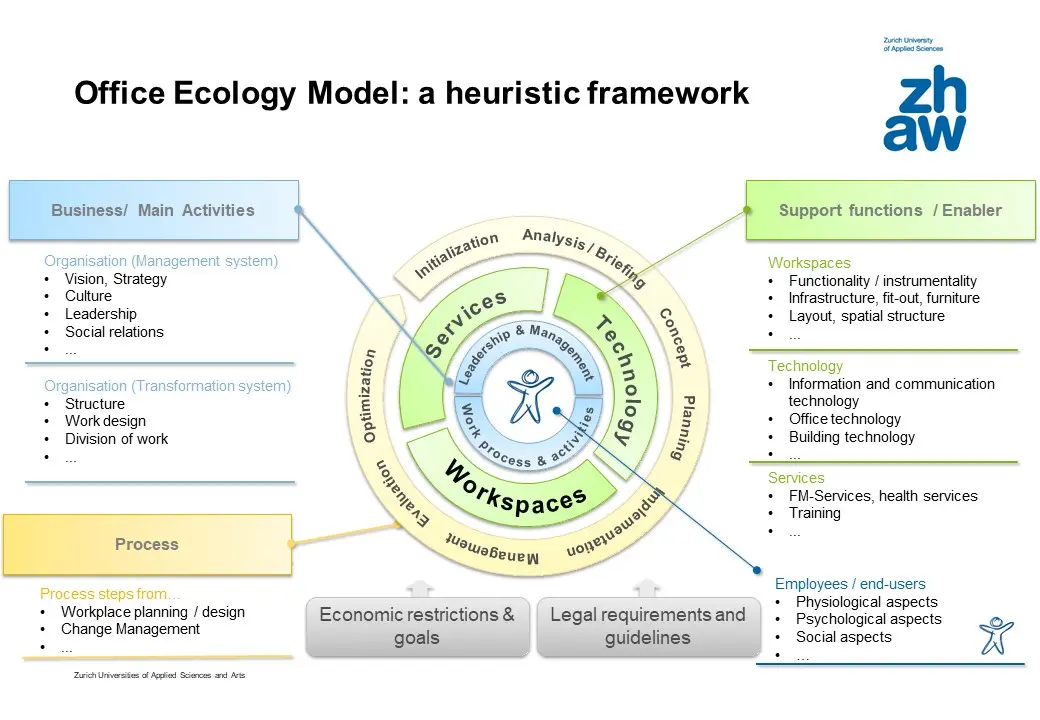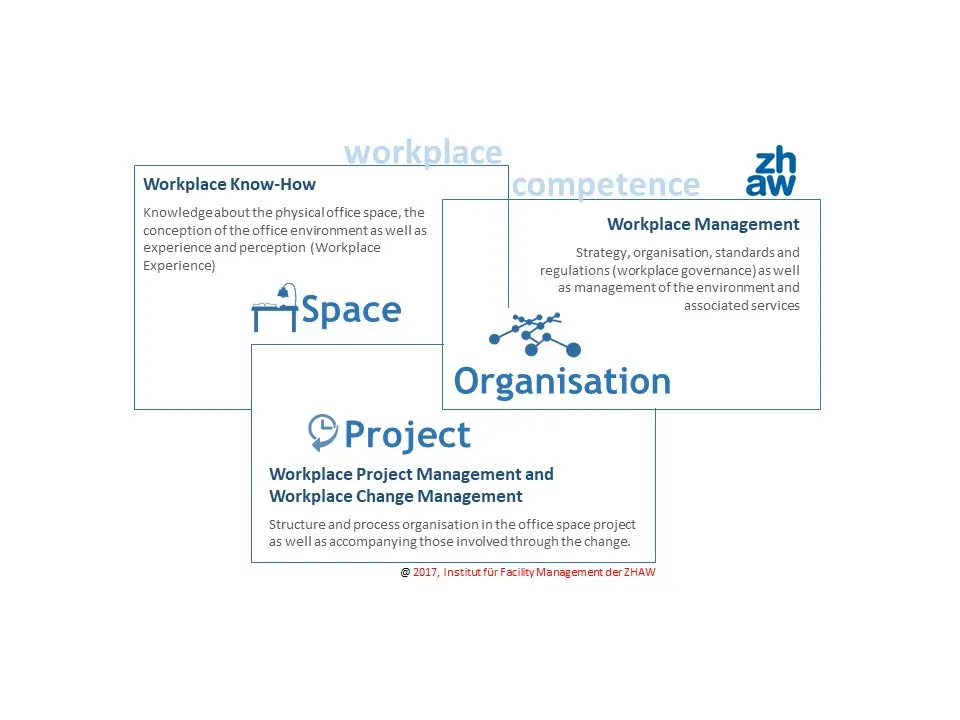Working environments and offices have changed considerably in recent years. Individualisation, autonomy and flexibility characterise the working world and place new demands on working environments. Among other things, changes in working methods and channels of communication have resulted in new spatial and organisational solutions. The specialist discipline Workplace Management deals with these often complex interrelationships between core tasks, design of the work environment and the individual.
In the research group Workplace Management we investigate the design and management of work environments with regard to the integration of spatial, human, technical and organisational factors. That which makes economical and ecological sense should be combined with that which is individually desirable, for example by analysing the effects of the working environment on the health, performance and satisfaction of employees. Current trend topics such as Future Work, Digitalisation or Workplace Experience create a variety of facets in our work.
How we understand our work
Our work is based on a holistic understanding of the human-workplace environment system: the Office Ecology Model. This describes office environments as a system in which spatial-material factors interact with work processes, organisational culture, employees, social relationships, and information and communication technologies (see Figure: Office Ecology Model). According to our understanding, the overall office system can only function optimally if the various elements are coordinated with each other. Thus the design of office environments alone does not guarantee success or failure, nor does solely management, strategy, employees or the change management process; the interaction makes the music. As a result, the overall system has an effect on people's experiences and actions, which can influence target parameters such as health, performance and employee satisfaction.
On the basis of the Office Ecology framework model developed at the ZHAW Institute of Facility Management, special attention is paid to the interaction between the office environment, information and communication technologies, services, work tasks as well as culture and superordinate strategies in the various steps of our consultancy and/or research projects. For example, in our consultancy we attach particular importance to the fact that the office space not only supports the functionality and processing of core tasks, but also the health and satisfaction of the employees.
Space, Project and Organisation
Workplace Management is a particular topic within Facility Management. This focuses on office environments or on workplaces for knowledge work. The Workplace Competence of IFM comprises three spheres of activity (see figure):
- Workplace Know-How: Knowledge about the physical office space, the conception of the office environment as well as experience and perception (Workplace Experience)
- Workplace Management: Strategy, organisation, standards and regulations (workplace governance) as well as management of the environment and associated services
- Workplace Project Management und Workplace Change Management: Structure and process organisation in the office space project as well as accompanying those involved through the change
The research group Workplace Management of the Institute of Facility Management researches with a holistic and systemic approach and develops new theoretical and application-oriented knowledge in various projects.
Projects
- Offices, Change & Health / Projektleiter: Lukas Windlinger / 01.01.2015
- Qualität von Nachhaltigen Bürogebäuden / Projektleiter: Lukas Windlinger / 01.06.2012
- Business Clubs - Produktivitätssteigerung durch neue Arbeitsformen und aktivitätsorientierte Büros / Projektleiter: Lukas Windlinger / 01.01.2010
Diverse Entwicklungsprojekte mit Schweizer KMU und Grossunternehmen.
Publications
-
2024.
Fachkräftemangel – Fact oder Fake?.
fmpro service.
2024(3), pp. 23-26.
Available from: https://doi.org/10.21256/zhaw-30971
-
Wheele, Theresa,
2023.
In:
29th Annual Conference of the European Real Estate Society (ERES), London, United Kingdom, 12-15 July 2023.
-
Bornioli, A.; Vermeulen, S.; Ratcliffe, E.; Anderson, T.; Pasanen, T.; Weber, C.,
2023.
In:
International Conference of Environmental Psychology (ICEP), Aarhus, Denmark, 20-23 June 2023.
-
Wheele, Theresa; Weber, Clara; Windlinger, Lukas; Haugen, Tore; Lindkvist, Carmel,
2023.
Buildings.
13(2), pp. 339.
Available from: https://doi.org/10.3390/buildings13020339
-
Werkmann-Karcher, Birgit; Zirkler, Michael; Windlinger Inversini, Lukas; Weber, Clara,
2023.
Flexibilisierung der Arbeit in Raum und Zeit
.
In:
Werkmann-Karcher, Birgit; Müller, Andrea; Zbinden, Tatjana, eds.,
Personalpsychologie für das Human Resource Management.
Berlin, Heidelberg:
Springer.
pp. 245-279.
Available from: https://doi.org/10.1007/978-3-662-65308-1_13
Network
Workplace Round Table Schweiz (Gastgeber)
- Spaces & Places im Spital – Neue Arbeitswelten Schweizer Spitäler (Gastgeber)
- SGO NA CoP – Neue Arbeitswelten, Community of Practice (Mitglied)
- und weitere

